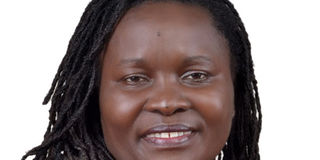Achievements women have made through the 57 years of independence

Emilly Comfort Maractho
What you need to know:
- Celebrating women. There are many women to celebrate, many of them not running the government or big business, but whose enormous contribution to their households alone, has greater multiplier effect.
Every year on Women’s Day and Independence anniversary, I am asked about how much I think women have progressed, whatever that means.
Normally, I speak about the usual issues of increased number of women in politics, the fact that a woman leads Parliament of Uganda and a host of other institutions are led by women, I mention the high number of girls who can access education today and get into higher education, not forgetting women who are employed and also own property out of their sheer hard work. I end with the many things that have not worked for women.
Someone who knows so much about what has not worked for women is [ former Ethics minister]Ms Miriam Matembe. Recently, I had the privilege of finally meeting Ms Matembe. It was helpful in putting a face to this woman, understood and misunderstood in equal measure.
As Uganda Media Women’s Association (UMWA), we had developed a curriculum for gender-sensitive reporting and invited Ms Matembe as our chief guest to launch it. By the time she was done speaking, I hated to go to the podium, where I was supposed to make concluding remarks for the day.
She had made speaking difficult for me with her eloquent and vivid presentation.
I wished it was one of those meetings complete with entertainment so that I get time to recover before going to speak.
Ms Matembe recounted how hard they worked as women in the Constituent Assembly and what it meant to have broken out of ‘their cages’ to challenge the barriers against women.
Her reminiscence of the times working with other gender interest civil society such as UMWA, launching Mama FM and declaring that women were ‘audible at last’, having gained some visibility through publications like the ‘other voice’, was so moving that I momentarily lost my voice.
Despite all the achievements, she said things were still difficult. ‘I know we have come a long way, but we move one step forward and two steps back,’ she said.
She lauded UMWA for developing the curriculum as a step in the right direction, but said she still had trouble accepting that women’s issues should be lost in the language of gender, because women’s challenges are still very deep and need to be treated as such.
Yet, it was in her recollection of how she was seriously harassed and bashed by the media and sections of society, and how she had been presented by the media as a ‘dangerous, terrible woman who had come to destroy the world’ that touched me.
To that, she added, ‘although much has been achieved, we have a long way to go.’ She expressed frustration that although they got the gender- sensitive constitution they fought for, implementation has remained a challenge.
Ms Matembe’s speech helped me to understand why a journalist in my Master’s class of Media, Gender and Social Justice two months ago not only posted on his Facebook wall that the gender course was the most useless course he had ever attended in his life, but also told me and the class that he would have perhaps appreciated the course if Ms Matembe had taught it.
His argument was that Ms Matembe, a married woman and with so much experience of being in the trenches, would know what she was talking about.
I also understood why the media follow her around. Thinking back on that day two weeks ago, this 57th independence day, I choose to celebrate women who ‘broke out of their cages’ to challenge barriers women in society face.
They may not have completed dealing with all the challenges women continue to face, but they opened the space to push back on some of the social injustices for women.
There are many women to celebrate, many of them not running the government or big business, but whose enormous contribution to their households alone, has greater multiplier effect.
These women have sometimes carried the weight of the world without us realising it that only dawned on me as I listened to Ms Matembe that day.
We, in turn, have tended to vilify them for not conforming to our perceptions of gender roles, of asking for more and demanding that justice is done through legal reforms and advocacy. Understanding the importance of women’s empowerment is crucial for socio-economic transformation.
The challenges people like Ms Matembe faced at their time may have changed, but there are new forms that represent the two steps back she talked about. Those women have done a lot to create space for important conversations to happen, but we cannot afford to continue asking them to fight for us.
Dr Maractho is the head and senior lecturer, Department of Journalism and Media
studies at UCU. [email protected]




